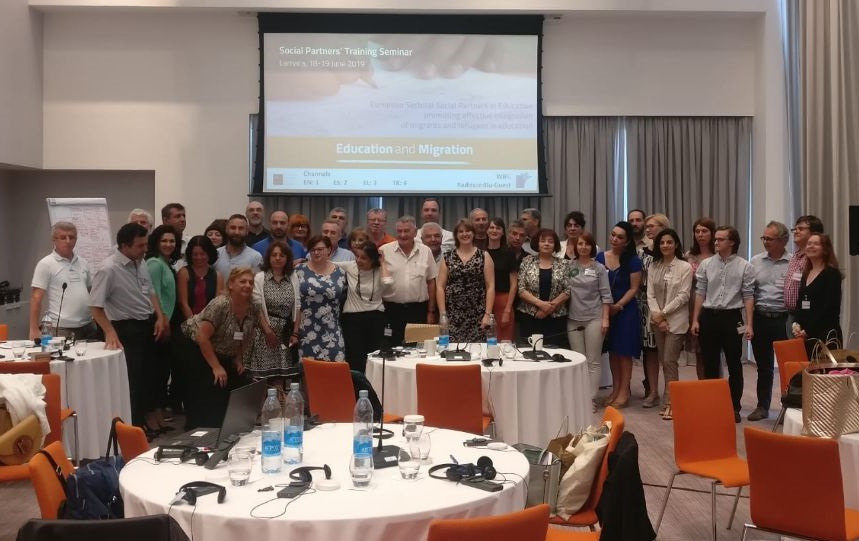ETUCE and EFEE join forces to fully recognise the right to education to migrant and refugee children in the EU
Published:
Fences and walls, detention camps, attacks on NGOs rescuing the lives of those attempting to cross the Mediterranean Sea in the desperate search for a better life, and inhuman behaviours against migrants and refugees fleeing wars, persecutions and starvation are only some of the events which are worryingly multiplying in today’s Europe. Every day, tirelessly, with commitment and determination, teachers and their unions are at the forefront of the struggle for ensuring all children an educational experience which is meaningful and of a high quality, challenging fears, prejudices, racism and xenophobia, while fostering inclusion and acceptance from the classroom.
On the eve of 2019 World Refugee Day, on 18-19 June 2019, Central Eastern and South Eastern European education social partners members of ETUCE and EFEE (the European Federation of Education Employers) met in Larnaca, Cyprus, in the framework of the project ‘European Sectoral Social Partners in Education promoting effective integration of migrants and refugees in education’ to share challenges, best practices and common solutions to improve access to education, the educational experience and outcomes of migrant and refugee children, often the most vulnerable in society.
Aware of the sprawling nature of this humanitarian crisis, European education social partners are pointing the nose in the same direction, that is the one of inclusion. Education trade unions and education employers in Southern and Central Eastern European countries reflected on context in which the education personnel operates. Despite societal and political challenges, concrete steps and alliances can be built to mitigating the devastating impacts of the situation that migrant and refugee children face. Social partners discussed about models and organisation of education system adapting to the needs and experiences newcomers bring along, about pedagogical approaches to value every child’s resource, including learning in mother tongue and willingness to learn and to start a new life, and the need for multi-sector and multi-stakeholder approach for an effective inclusion in the wider socio-economic context of the host country. Together with representatives from the Red Cross EU, COFACE Families Europe, Eurochild, FeSP-UGT and parents’ associations, unions and employers discussed ways to serve the well-being of the children. The right of the child is to be at the core to any policy option being in a EU-destination or transit country, as they are equally displaced through no fault of their own.
Their fruitful discussions, together with the inputs of social partners participating to the first training seminar in Copenhagen, are the basis for a potential set of ETUCE-EFEE Joint Practical Guidelines on how to promote effective integration of migrant and refugee learners in the education and socio-economic environment of the host countries through joint social partner initiatives at national, regional and local level, which are to be presented at the project final conference, on 14-15 October 2019, in Brussels.
Recognising the tremendous task ahead of the education personnel, Susan Flocken, ETUCE European Director, said: ‘Teachers must be supported in providing quality education to all children, regardless of their migration status. Increased public funding, adequate teacher training, but also the support of all actors involved in ensuring the well-being of migrants and refugees are prerequisites for the education personnel to offer a structured and sustainable quality education to all, breaking the barriers that prevent equal opportunities in life.’